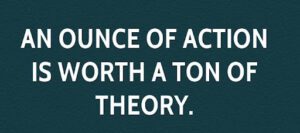 When we’re faced with something we don’t like about ourselves, our minds often drift to the past. We closely examine what we’ve experienced in the past and how it may be contributing to a particular weakness we have or obstacle we face. We’re certain that once we develop a theory about why we are the way we are, those things will change. I watch myself, my friends, my family, and my clients engage in the relentless pursuit of theorizing about why we are the way we are when, in fact, there is very little empirical evidence supporting the notion that this will help us to change at all.
When we’re faced with something we don’t like about ourselves, our minds often drift to the past. We closely examine what we’ve experienced in the past and how it may be contributing to a particular weakness we have or obstacle we face. We’re certain that once we develop a theory about why we are the way we are, those things will change. I watch myself, my friends, my family, and my clients engage in the relentless pursuit of theorizing about why we are the way we are when, in fact, there is very little empirical evidence supporting the notion that this will help us to change at all.
When a client comes into my office wanting to understand why they’re struggling with something, we do discuss it, of course . We spend time talking about whatever they want to talk about with an eye towards how this will inform their future behavior. We discuss what they can learn from these insights so that they can incorporate some new coping skills. We talk about how they can use what they’ve learned in the past to help them to grow and change in the present.
But rather than focusing only on developing an elaborate theory about the past, we talk extensively about the client’s values and why they want to change. What will change look like for them? What will they be doing? How will they be feeling? What will a day in their life look like once they’ve achieved their goals? We discuss the many successes they’ve had when achieving difficult goals and the other times they’ve created positive changes in their lives. The client defines clear and achievable goals, and we break down action steps for achieving them. We talk about the obstacles they might face and strategize about how they will respond. These steps are what science suggests are key to successful change-making: clarifying your strengths, setting realistic goals for things you can change, and following a specific, strength-based action plan. As a coach, this is how I use science to ignite change. Spending lots of time theorizing about how our past impacts our present lives is not included in this list. Doing this often inhibits the process of change. (Also, there are strong arguments about how we all can, regardless of what we’ve previously experienced, take responsibility for our choices in the current moment.)

One of the fundamental lessons I’ve learned over my thirty-plus-year career is this: “An ounce of action is worth a ton of theory” (Quote often attributed to Ralph Waldo Emerson). Of course, some insight is relevant to the process of growth and change. Self-reflection can help us understand who we are and why we behave the way we do. But gaining that insight, in and of itself, is not sufficient to produce change. Ruminating on the past keeps us anchored in it, and focusing on the past does not help us change the present.
